Buck Chintamani, Infor GT Nexus Commerce Network
A dinner table conversation with my daughter about the need for sound ethical practices in business, brought home to me the vital role played by the supply chain in the world today.
The conversation started innocuously enough from a discussion about how her favorite corporation, Apple, was trying to source cobalt directly from mines in the Democratic Republic of Congo. This is a nation where Amnesty International and other rights groups have raised awareness about the use of child labour in mines. Our conversation went onto other things—like, is it proper for Apple to be sourcing cobalt from such mines, or should they find alternate means, technologies, and materials, to manufacture the batteries needed for mobile phones?
We discussed how the free market creates the best process to ensure that humane labour practices are followed. Apple has already announced it is joining the Responsible Cobalt Initiative and plans to source directly from mines, thereby eliminating a complex network of middlemen and thus ensuring ethical business practices in the mines. We know of Levi Strauss & Co. leveraging payment incentives to cause its suppliers to act in an ethical, environmentally sound manner across the world.
But these are both companies with the heft and scale to make a difference directly. What do the others need to do? How can they ensure that dangerous waste from a manufacturing process is not contaminating ground water in a country without the environmental safeguards and ability to enforce them? How can they avoid their products being found to be manufactured in an unauthorized factory location?
Many businesses discovered this reality the hard way in the aftermath of the collapse of the Rana Plaza complex in Dhaka, Bangladesh—a five-story commercial building that contained multiple clothing factories, apart from a bank, apartments, and other establishments.
Supply chain best practices and innovations are key here. Applying traceability to track origins of products in the supply chain ensures both their authenticity and the assurance that applicable laws and business practices have been followed.
Factory location certainty is an emerging solution that makes it difficult for suppliers to manufacture and ship products from an unauthorized location. Integrating payments and settlements with the procurement process helps build incentives for appropriate behaviour by suppliers. Ensuring continuous visibility into shipments prevents unauthorized diversions and pilferage of products. Optimizing modes of shipment and minimizing expediting, coupled with insights into carbon footprint, allows corporations to make the best transport decisions from an environmental perspective that are also profitable ones.
The fact that ethical sourcing stories have made their way into mainstream news and dinner table conversations might be a sign that the supply chain is increasingly receiving the recognition – and scrutiny – that such a vital component of the global economy merits.
With the challenge for us in the supply chain to be increasingly vigilant and proactive, there is also good news—as we move ahead at a rapid pace, the next generation inheriting our businesses will enter the workplace with ethical practices front and centre in their minds.













